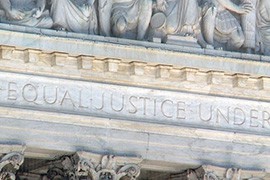- Slug: BC-CNS-Deportation Relaxation,870
- File photo available (thumbnail, caption below)
By KYLEY SCHULTZ
Cronkite News
WASHINGTON – The Supreme Court ruled Tuesday that a federal law allowing deportation of immigrants who commit “crimes of violence” was unconstitutionally vague, a decision hailed by Arizona immigration lawyers as a “promising step forward.”
The law lists specific aggravated felonies like rape and murder as crimes of violence, but also includes any crime that involves “substantial risk that physical force … may be used.” The court said that the language forced judges to rely on “guesswork and intuition” to determine what a crime of violence is.
“Does a conviction for witness tampering ordinarily involve a threat to the kneecaps or just the promise of a bribe? Does a conviction for kidnapping ordinarily involve throwing someone into a car trunk or a noncustodial parent picking up a child from daycare?” wrote Justice Neil Gorsuch, the surprise swing vote in the 5-4 decision.
The ruling was welcomed by immigration attorneys, who said the aggravated felony standard was a “difficult subject” for accused immigrants and their lawyers.
“There is a huge narrative this administration is pushing on who immigrants are and why they are here,” Ruben Reyes, a Phoenix-based immigration attorney, said of the Trump administration. “The decision the court made today levels the playing field a bit by giving attorneys more protections to argue for immigrants when the government is looking for a slam dunk against them.”
The case began when Philippine native James Dimaya, a permanent legal resident who had been living in California since 1992, was convicted of two separate burglaries. An immigration judge ruled that the burglaries were crimes of violence, making Dimaya deportable as an aggravated felon.
After he was ordered deported in 2010, he challenged the law as too vague. Since the burglaries were not violent, he argued, they should not have warranted deportation.
While his case was pending, the Supreme Court overturned the Armed Career Criminal Act (ACCA), saying its definition of “violent felony” was unconstitutionally vague. The 9th U.S. Circuit Court of Appeals applied that ruling in Dimaya’s case and ruled in his favor.
In a dissent Tuesday, Chief Justice John Roberts said the ruling in the ACCA case was not the same as Dimaya’s case. The immigration law, a civil proceeding, “was not unconstitutionally vague even under the standard applicable to criminal laws,” which is stricter in its application, wrote Roberts, joined by Justices Samuel Alito, Clarence Thomas and Anthony Kennedy .
Justice Elena Kagan disagreed, writing for the majority that the ACCA ruling was “a straightforward decision, with equally straightforward application here.”
Gorsuch, appointed by President Donald Trump and expected to join a conservative majority on the court, sided with Kagan in this case.
“This isn’t your everyday ambiguous statute,” Gorsuch wrote in a concurring opinion. “It leaves the people to guess about what the law demands – and leaves judges to make it up.”
The Justice Department declined to comment on the ruling Tuesday. But Tucson immigration attorney Mo Goldman said that the aggravated felony standard has been a problem.
“There are some crimes that are well defined, like a murder or kidnapping, and some that are not,” Goldman said. “When you look at this residual clause including crimes of violence, that’s where you start to get into this gray area that was found to be unconstitutionally vague.”
Goldman said few of his clients will be directly affected by the ruling, but that the court’s decision would serve as a “great equalizer to the concept of due process” and set the tone for the importance of legal clarity, regardless of the charges.
Reyes said aggravated felonies make up “an extremely small percentage of the totality of immigration cases that most immigration lawyers have,” and that most of his clients are stopped on low-level misdemeanors or repeated traffic violations. But he believes the decision has the potential to assist many immigrants who are challenged with language barriers and confused by heavy legal jargon.
“When you have someone who is not educated, well-versed in English or well-read on how the law works here, they are more likely to be removed quickly because they do not assert their rights,” Reyes said. “Because of that, they don’t receive due process – so the greater message this case makes is that competent litigation and concise language matters.”
In his dissent, Roberts noted the government’s argument that the definition of aggravated felony the court ruled on “is ‘critical’ for ‘numerous’ immigration provisions.”
But Gorsuch said the ruling Tuesday was a narrow one and that it is “important to acknowledge some limits on today’s holding” and the fact that Congress can still rewrite the law to make it acceptable.
“It does not forbid the legislature from acting toward any end it wishes, but only requires it to act with enough clarity that reasonable people can know what is required of them and judges can apply the law consistent with their limited office,” Gorsuch wrote.
But Reyes said the court’s ruling was the right one to make.
“This case doesn’t just change for Dimaya,” Reyes said. “It changes for a whole group of people who otherwise would be set up for deportation under a very vague standard that has been used to hammer people – I think, abusively so.”
For more stories from Cronkite News, visit cronkitenews.azpbs.org.
^__=
Web links:
_ Sessions v. Dimaya: https://www.supremecourt.gov/opinions/17pdf/15-1498_1b8e.pdf
_ Johnson v. U.S. (ACCA case): https://www.supremecourt.gov/opinions/14pdf/13-7120_p86b.pdf
_ INA: https://www.law.cornell.edu/uscode/text/8/1227
_ U.S. Code, Title 18, Section 16: https://www.law.cornell.edu/uscode/text/18/16
^__=
The Supreme Court said an immigration law that allowed deportation of immigrants who committed crimes of violence was unconstitutionally vague when it comes to defining what a “crime of violence” is, with the surprising swing vote coming from Justice Neil Gorsuch, a Trump appointee. (Photo by Nathan O’Neal/Cronkite News)
